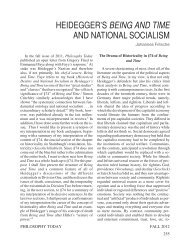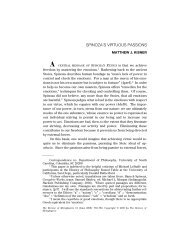The Essay as Self-Knowledge: Montaigne's Philosophical ...
The Essay as Self-Knowledge: Montaigne's Philosophical ...
The Essay as Self-Knowledge: Montaigne's Philosophical ...
Create successful ePaper yourself
Turn your PDF publications into a flip-book with our unique Google optimized e-Paper software.
66 ANN HARTLE<br />
way of seeking “that which is” (ce qui est), and he mocks the professional<br />
logicians who have learning but not understanding: “Do we<br />
witness more of a jumble in the chatter of fishwives than in the public<br />
disputations of the professional logicians? I would rather have<br />
my son learn to speak in the taverns than in the schools of talk”<br />
(VS926–27; F707). Montaigne’s use of the vulgar language is not<br />
simply a rhetorical move, but an ontological necessity: truth is more<br />
manifest in the chatter of fishwives than in the disputations of professional<br />
logicians.<br />
MONTAIGNE’S AUDIENCE<br />
In “A consideration upon Cicero,” Montaigne tells us that he would<br />
have willingly adopted the form of the letter to publish his thoughts<br />
if only he still had his friend, LaBoétie, to address them to. “I would<br />
have been more attentive and confident, with a strong friend to address,<br />
than I am now, when I consider the various t<strong>as</strong>tes of a whole<br />
public” (VS252; F186; emph<strong>as</strong>is added). 8 On the one hand, then, the<br />
<strong>Essay</strong>s are addressed indiscriminately to an entire public. <strong>The</strong>re are<br />
also instances in the <strong>Essay</strong>s where he addresses directly a particular<br />
individual, always a woman. But there are at le<strong>as</strong>t two places where<br />
he identifies a certain kind of individual <strong>as</strong> his primary addressee. In<br />
“Of vain subtleties,” he says that the <strong>Essay</strong>s “might get by in the<br />
middle region [of men].” Elsewhere in that same essay, the middle<br />
region is identified <strong>as</strong> the place of error, but error from which and<br />
through which it is possible to arrive at “the extreme limit of Christian<br />
intelligence” (VS313; F227). In “Of presumption,” he <strong>as</strong>ks: “And<br />
then, for whom do you write?” <strong>The</strong> learned value only science, erudition,<br />
and art. <strong>The</strong> common souls cannot appreciate the grace of an<br />
elevated and fine discourse. “Now, these two types fill the world.<br />
<strong>The</strong> third cl<strong>as</strong>s into whose hands you come, that of minds regulated<br />
and strong in themselves, is so rare that for this very re<strong>as</strong>on it h<strong>as</strong><br />
neither name nor rank among us; it is time half w<strong>as</strong>ted to <strong>as</strong>pire and<br />
strive to ple<strong>as</strong>e this group” (VS657; F498).<br />
Montaigne’s primary addressees are those who are prone to error<br />
on account of re<strong>as</strong>on and who, at the same time, are not incurably<br />
learned, learned in the purely conventional sense. <strong>The</strong>y are independent<br />
and capable of self-rule. <strong>The</strong>se are the individuals who are susceptible<br />
to reformation, who “will not fail to come back to themselves and

















